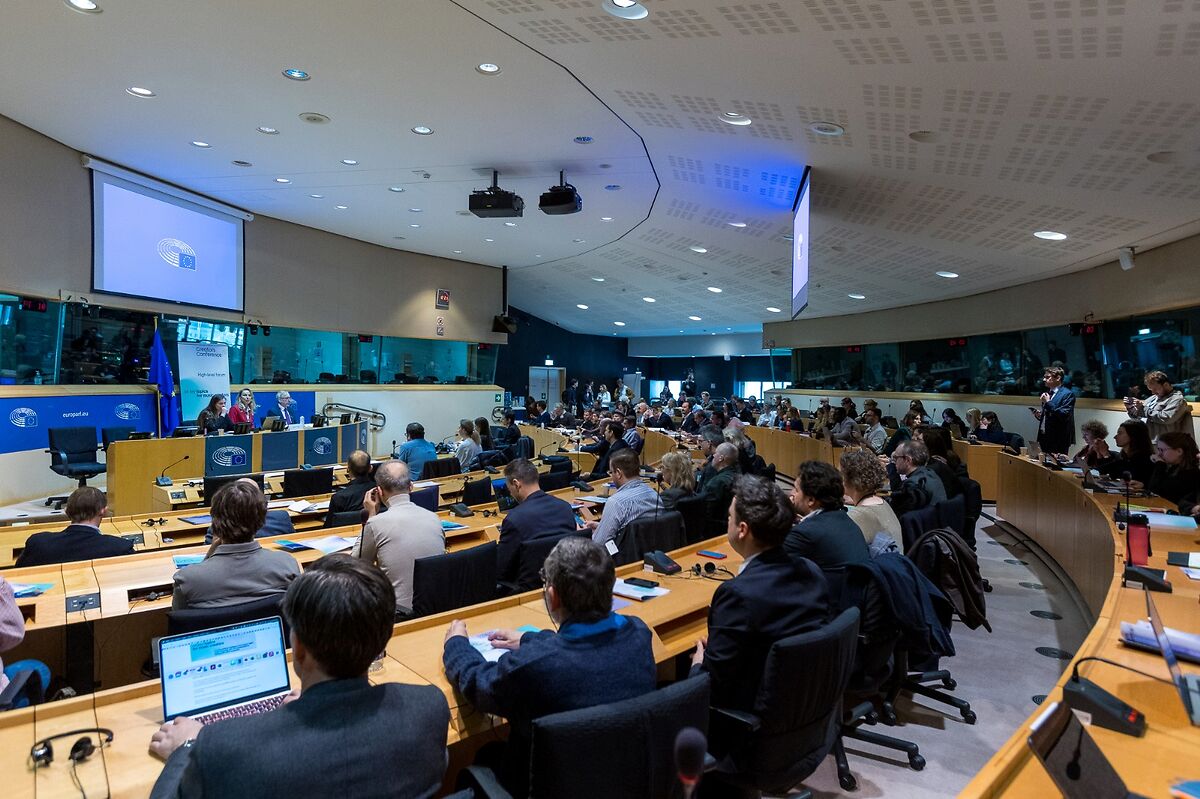Press release: A Sustainable Future for Music Authors: Insights from ECSA’s 2025 Creators Conference

BRUSSELS - Today, the European Composer and Songwriter
Alliance (ECSA) held the seventh edition of its Creators Conference under the
patronage of the European Parliament. Hosted by Members of the European
Parliament (MEPs) Bogdan Andrzej Zdrojewski (EPP – Poland) and Emma Rafowicz
(S&D – France) at the European Parliament in Brussels, ECSA's flagship
event brought together music creators, EU policy makers and stakeholders across
the cultural and creative sectors to discuss the challenges affecting music
creators’ livelihoods and shape the future of the music sector.
The conference opened with a welcoming speech from MEP Bogdan Andrzej
Zdrojewski, who stated: “This Creators Conference provides a unique opportunity
to listen to the challenges faced by music creators when it comes to AI, music
streaming and contracts. If we want to make concrete steps to improve the
working conditions of artists and creators, it is essential to foster a
democratic debate about their needs and ensure that the recommendations of the
European Parliament lead to concrete actions by the European Commission”.
MEP Emma Rafowicz further underlined the challenges facing authors for the use
of their works by AI companies, stating: “One of the crucial issues the European Parliament must tackle is AI
and its impact on authors’ rights. We must guarantee that the three principles
of transparency, consent, and fair remuneration for creators are at the heart
of the upcoming AI strategy for the cultural and creative industries.”
Following this, Commissioner for Intergenerational Fairness, Youth, Culture and
Sport Glenn Micallef delivered a video keynote in which he stressed the
importance of implementing the AI Act in a fair manner and ensuring that the
voice of music creators is heard across all policy initiatives related to
copyright, generative AI and streaming.
The first panel was dedicated to copyright and generative AI, providing an
overview of the main challenges posed by AI training to music authors, creators
and others rightsholders in the context of the current EU legal framework.
Dominick Luquer (Secretary General of the International Federation of Actors)
presented the key concerns for authors, performers and creative workers, and
discussed the ongoing Code of Practice consultation and current template
summary presented by the AI Office. Prof. Alexandra Bensamoun (Université
Paris-Saclay) elaborated on her report on the implementation of the AI Act,
and Dr. Julia Niebler-Kaiser (Deputy General Counsel of GEMA) introduced the
legal action taken by GEMA against Suno and OpenAI for using copyright protected
works without a license. The panel also explored potential alternative
licensing and remuneration strategies for music creators and other
rightsholders. Moderator Helienne Lindvall (Songwriter and ECSA President)
emphasised the need for decisive action, stating: “We
need to uphold authors’ rights and provide legal certainty by making sure the
AI Act is implemented in a way that allows authors and other rightsholders to
fully exercise their rights”.
Former MEP Ibán García del Banco underlined the urgent need to build a fairer
streaming ecosystem and a sustainable future for music creators by acting on
the recommendations of the European Parliament’s report on “Cultural diversity
and the conditions for authors in the European music streaming market”.
Following this, Aafke Romeijn (Songwriter and ECSA Board member) moderated a
panel addressing the challenges faced by composers and songwriters in the
current music streaming market with panellists Ferid Lakhdar (Composer,
Vice President of ZAiKs), Chris Cooke (Co-founder and Main Director of Complete
Music Update) and Tobias Stenkjær (Songwriter, Chair of Danish Popular Auteurs
and Chair of ECSA’s Music Streaming Working Group). As pointed out by Tobias
Stenkjær: "The European Commission should build a
dialogue between all music stakeholders to work on concrete measures such as
the improvement of authors’ identification on streaming services, transparency
of algorithms and playlists, and the combat of fraud.”
The last panel of the conference, moderated by Anselm Kreuzer (Composer, ECSA
Board Member) was dedicated to harmful contractual practices facing
audiovisual composers, in particular the detrimental effect of buyout
contracts and “pseudo-publishing” practices. He introduced ECSA’s recently
published report on contractual practices and stated: “We need policy solutions
as well as a common understanding in the audiovisual industry to ensure that
composers are not deprived from a long-term remuneration in proportion to the
use of their works." Panellist Emmanuelle Du Chalard (Head of Copyright
Unit, DG CNECT, European Commission) presented the European Commission’s
learnings through its study on contracts[1], which
will be published soon. Adriana Moscoso del Prado, General Director of
GESAC, emphasised the collective management organisations’ role in tackling
buyouts and other unfair contractual practices, and said: “Buyout clauses form
a fundamental problem for authors' rights. We look forward to work together
with European policy makers to promote fairness and ensure fair and
proportionate remuneration for creators”. Additionally, she referred to last
month’s letter to Executive Vice-President Virkkunen and Commissioner
Micallef, signed by 41 MEPs, including Bogdan Andrzej Zdrojewski and Emma
Rafowicz. The letter, which highlighted the need to ensure fairness and protect
Europe’s creative strength and cultural diversity, called to address the long-standing power imbalance
between creators and global platforms and the need for legislative action
against buyouts imposed by VOD platforms.
In her concluding
remarks, Helienne Lindvall reaffirmed ECSA’s commitment to advocate for
sustainable industry practices, and emphasised the vital role of EU
policymakers in championing the needs and priorities of music authors, while
supporting the growth and sustainability of the whole music sector.
The Creators Conference 2025 was co-funded by
the Creative Europe programme of the European Union and supported by ZAiKS,
GEMA, BumaStemra, SACEM, PRS, OSA and SABAM.
[1] The study aims at examining contractual practices used in the creative sectors to transfer copyright and related rights from authors, performers and producers to contractual counterparts exploiting these rights.
Photo credit: Omar Havana